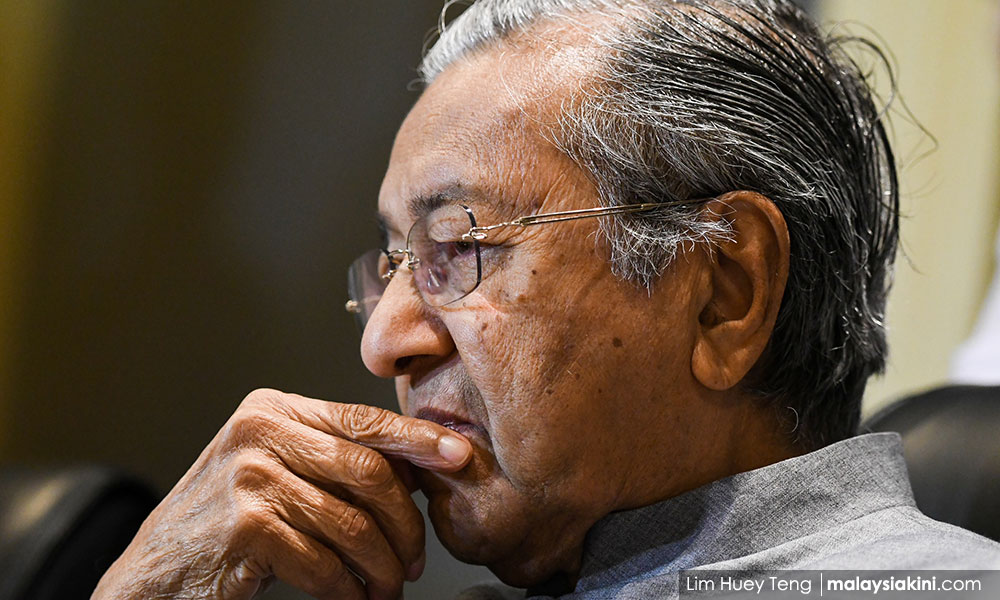
I was asked this question, “What if voting for Pakatan Harapan brings back Mahathirism and creates another disaster for Malaysia?” My answer is that it could.
But for me, the present BN government under the leadership of 1MDB-tainted Prime Minister Najib Razak poses a clear and present danger to this nation.
What is at stake is not just the economic well-being of Malaysians but the very social fabric of our multi-ethnic and multi-cultural society. To stay in power and escape prosecution, he has shown that he is prepared to compromise with religious fundamentalists to change the secular nature of this country and deploy more draconian laws against dissenters.
Mahathirism as an ideology
If you are talking about Mahathirism as an ideology of repression, racism, cronyism and corruption, you already have its full manifestation in Najib's Umno. Mahathir laid the foundation to Mahathirism but Najib has taken it to the next level with unbridled kleptocracy.
Furthermore, time is on Najib’s side. He is 65 years old while Mahathir is 93. Can personal ambition really be Mahathir's motivation? Unlikely. Some would say that he is paving the way for his son Mukhriz who is the deputy president of Bersatu or that his ultimate goal is to merge with a defeated Umno minus Najib. Perhaps.
Again, we are dealing with speculations versus present reality. I choose to take a chance with Harapan - even one led by Mahathir - because my fear is that any other choice would lead our nation to eventual ruin.
Another reason I favour Harapan is that Mahathir's Bersatu does not dominate the opposition coalition the way Umno does BN. Whether it will eventually do so one day is, again, in the realm of speculation.
But as it stands, the way electoral seats are allocated, no one party in Pakatan could dominate or impose their agendas on the others. It is in this power tension that consensus-based decision-making is more likely to take place, and we should find safety in such a balance of power.
Greater commitment to reforms
Harapan has not been silent on the commitment to reforms either. Mahathir himself has committed to reforms that deal with corruption, political funding, a two-term limit for the PM and, generally, on the need for separation of powers between the executive, legislative and judiciary. Granted, it could - and should - go further with details of institutional and electoral reforms, but these are definitely steps in the right direction.
Voting in an election is about making a choice. Some may begrudge that this time around, we are presented with two unpalatable options and that they had to choose between the lesser of two evils. But hasn't it always been that?
When was there a coalition that was perfect and a reflection of all our ideals? Never, and that will never be. I put it to you that it has always been a choice between the lesser of two evils or - to the more positive-minded - between the better of two good options.
Rise of a third force?
Some think that if Harapan fails to seize power this time and even becomes totally annihilated, it would cause such a great disillusionment with establishment politics that it would usher in a third force. Personally, I doubt that a truly radical third force could arise from the ashes of the political abyss post-GE14.
If Harapan does collapse; new actors, new alignments and perhaps, a new name will take its place. The so-called third force itself would have to make compromises with parties that are race-based, religious, regional and ideologically incompatible.
Such is the nature of politics. You have to make compromises in order to accommodate the views of those you don't agree with. It is not about selling out. It is about representation, maintaining harmony, having consensus and building a nation.
Long and arduous process
Does this mean we lose sight of our goal of building a democratic and inclusive society where all are treated with dignity, where people are given equal access to education, to practise their beliefs (or not), to business, to healthcare, and so on? Absolutely not.
We cannot lose sight of our ideals but getting to those ideals is a long-term goal because change is oftentimes a slow and arduous process. It is not about an event called the general election. Elections are the opportunity citizens have to express their choice of which coalition best represents their aspiration. The emphasis is on "best represents", not "best".
No rivers are absolutely straight when they begin their journey from the mountains. They have to meander through valleys, rocks and other obstacles before they reach the sea. Likewise, achieving our ideals of a mature and functioning democracy requires navigating around obstacles, making compromises and accepting Plan Bs.
Sometimes it looks like it's regressing but as long as it is flowing, it is not. Participation in expressions of democracy like voting is to keep that river flowing; it cannot stop. If we still cherish the idea of democracy, voting is sacrosanct, a sacred duty of every citizen.
Understandably many are disillusioned and disappointed with the current state of politics and even of democracy itself. But as Winston Churchill said, "Indeed it has been said that democracy is the worst form of government except for all those other forms that have been tried from time to time."
It may not be perfect but it is still the best form for citizens to peacefully express their choice and effect a peaceful transfer of power. #EveryVoteCounts
THOMAS FANN is a social activist and chairperson of Engage, a non-government organisation that focuses on upholding democracy, defending human rights and promote social justice. He can be reached at thomas.fann@gmail.com.- Mkini
No comments:
Post a Comment
Note: Only a member of this blog may post a comment.